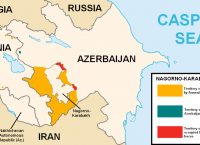
Դիվանագիտությունը բռնապետերի հետ (անգլերեն)
Original source: www.worldpolicy.org
By Anna Ohanyan
On April 2, the two-decade-long—yet still fragile—cease-fire ended in Nagorno-Karabakh, an ethnically Armenian breakaway region of Azerbaijan often described by analysts as a de facto state. This is a conflict with deep and haunting roots, the progeny of both a pre-Soviet Russian empire and a post-genocidal Ottoman one. It has remained a local affair in Russia’s periphery for years, frozen by the cease-fire and largely forgotten by the rest of the world.
The conflict in Nagorno-Karabakh today is no longer frozen or forgotten. Along with Donbass in Ukraine and Damascus in Syria, this conflict may have just taken its place among the string of conflicts ringing Russia’s underbelly, with suggestions of a Russian-Turkish proxy war. The implications of violent escalation in this energy-rich strategic region are significant, as it could lead to a confrontation between NATO and the Russian-led Collective Security Treaty Organization. As such, intensive and sustained diplomatic engagement to contain the violence and re-establish the peace process is urgently called for.
The conflict itself bears familiar hallmarks. It echoes challenges seen in Israel, Kosovo, Korea, and elsewhere. Since the original cease-fire of 1994, mediators led by the United States, France, and Russia have worked to square the circles of security, sovereignty, and self-determination. Azerbaijan claims absolute jurisdiction over Nagorno-Karabakh’s population; the Armenians affirm the irrevocability of their Soviet constitutional plebiscite on separation. The standoff has yielded a militarized frontline rivaled only by that on the Korean peninsula, and a generation that has known no alternative to confrontation.
Observers have attributed this month's large-scale offensive to the deteriorating position of Azerbaijan's authoritarian president, Ilham Aliyev. The dynastic leader of a petrostate hit hard by collapsing oil and gas revenue, Aliyev has extinguished independent civil society and has shuttered Western institutions ranging from Radio Free Europe to the Peace Corps.
As economic discontent rises, the Aliyev government's most menacing threats have been reserved for the Armenians. In increasingly strident tones reminiscent of the worst of North Korea's Kim Jong-un, Aliyev has called not only for the destruction of the Armenians of Nagorno-Karabakh, but has alsotargeted, in alarming fashion, all "Armenians of the world."
In this context, the motivation for any side to challenge the status quo is either diversionary or tactical. War can be used to distract from domestic plight or to gain leverage at the negotiating table. Certain triggers may have played into the timing of a diversionary military offensive, including the prominent role of the Aliyev family in the Panama Papers corruption scandal that was exposed the same week that hostilities erupted.
Nevertheless, there is heightened urgency for international mediators to diversify their interlocutors for short-term negotiations as well as for long-term peace processes. This means creating forums and spaces of cross-conflict engagement that include mid-level governmental officials, professional groups, teachers, and traders. The key actors, including the United States, Russia, France, Turkey, and even Iran, need now more than ever to speak with one voice on opening such new, and varied, frontlines of engagement. Conditions may be favorable for dissuading the Aliyev regime from further war and directing the president toward the negotiation table. A domestic economic crisis, the opening of Iran, and the urgent need for foreign direct investment are only some of the factors to that end.
In the short term, it is imperative to establish an accountable and transparent cease-fire regime. Many analysts have called for multinational peacekeepers and other mechanisms to be implemented along the front line. This is urgently needed. While there are over 10,000 peacekeepers between Lebanon and Israel, 1,000 in Cyprus, and over 4,000 in Kosovo, there are fewer than 10 part-time European monitors on the Nagorno-Karabakh front line.
For the longer term, it is time for much deeper diplomacy that is accountable and that engages at the societal level. First, decades of scholarship on peace processes in conflict regions worldwide have produced a consensus; all conflict parties need to be at a negotiating table for workable and sustainable agreements to emerge. To date, the Armenian community of Nagorno-Karabakh has been excluded from negotiations, at the insistence of Azerbaijan. This is untenable. Representatives of the population of Nagorno-Karabakh must be invited to join the negotiations on their own future.
Second, for diplomats and policymakers on both sides of the Atlantic, deeper diplomatic structures are needed. Working exclusively with the governments in Baku and Yerevan has precluded the development of a broader spectrum of stakeholders within the respective societies. A narrow focus on political elites has also allowed any peace process to be hijacked for domestic political purposes.
Instead of thinking about whether to keep the current Minsk Group format as laid out by the Organization for Security and Cooperation in Europe or to create new forums, embedding the peace process into broader societies in Azerbaijan, Nagorno-Karabakh, and Armenia, is essential. Building on the Minsk Group's institutional memory of the conflict over the past two decades is critical. In this framework, concrete links to engage with the publics in Azerbaijan, Nagorno-Karabakh, and Armenia is long overdue. Support for such measures from Baku, Stepanakert, and Yerevan needs to be unconditional.
Finally, regional approaches to conflict management through diverse policy areas must be deployed: pipeline and transportation security, economic development and trade, agriculture and water policy, policing of illicit flows of fighters and contraband, and foreign investment coordination are all better accomplished at a regional level among neighbors. What the West, including the United States, can do is to re-orient foreign policy in the former Soviet territories, particularly in South Caucasus, toward financial and political support for regional integration projects. This requires regionally designed foreign aid packages in conflict areas with deliberate support for cross-border initiatives and public diplomacy. It means pressure to lift blockades, reconnect rail links, return refugees, and observe cease-fire arrangements.
The broken state of South Caucasus as a region fuels the conflict. Lessons learned in the Western Balkans, Central America, and West Africa call for promotion of regional ties as a path toward conflict management. Regionally organized institutions will help to dilute the power of political elites, break down the complex conflict to smaller and more manageable issue areas, and offer avenues to address them in specialized forums and working groups, asexpressed by Laurence Broers of Chatham House. Regionally designed tools can help to transform the political environment in South Caucasus, softening borders and facilitating workable compromises.
World history is full of examples of dictators forging peace agreements with their foes. Can Aliyev be one of them?
*****
*****
Anna Ohanyan is Richard B. Finnegan Distinguished Professor of Political Science and International Relations and chair of the Department of Political Science and International Studies at Stonehill College in Massachusetts. She is a Fulbright Scholar and her latest book is Networked Regionalism as Conflict Management (Stanford University Press 2015).
